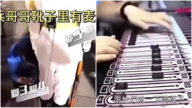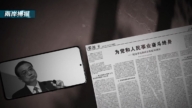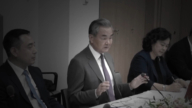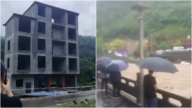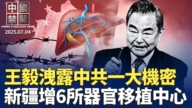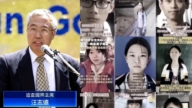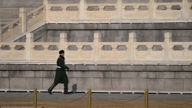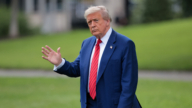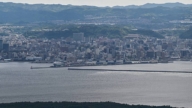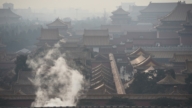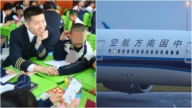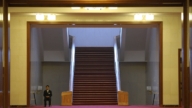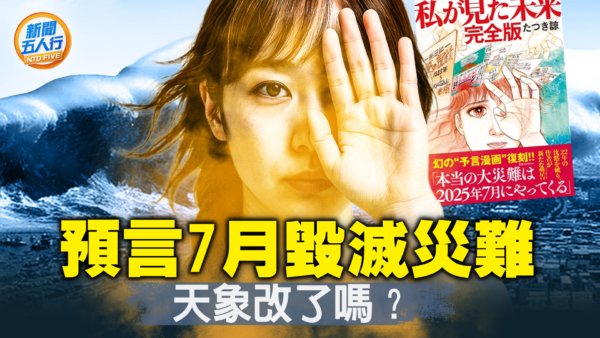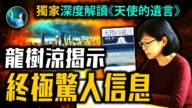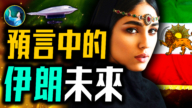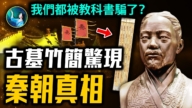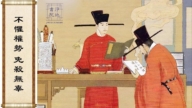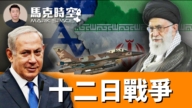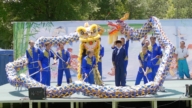【新唐人2013年05月10日讯】如果否定了毛泽东,中共的社会主义制度还能站得住吗?中共国家主席习近平提出,如果中共在邓小平“当时全盘否定了毛泽东,那中共就站不住了,站不住就会天下大乱。”但是,分析人士认为,毛泽东本身就是中国大乱的根源之一。下面就来听听专家的解析。
5月7号,中共党史专家齐彪在大陆媒体发表文章说,今年1月5号,习近平在一个研讨班上发表讲话,他提出了“两个不能否定”——“不能用改革开放后的历史,否定改革开放前的历史,也不能用改革开放前的历史,否定改革开放后的历史。”
文章披露,习近平还特别提及邓小平坚决维护毛泽东,他强调﹕如果当时全盘否定了毛泽东,那中共还能站得住吗?中共的社会主义制度还能站得住吗?那就站不住了,站不住就会天下大乱。
时政评论员汪北稷指出,习近平提出“两个不能否定”,是为了保护集权者的利益,延续中共独裁体制所做的决定,既要保住那些毛左,也要利用相对开放的人来搞活经济。汪北稷认为,习近平在走一条左右逢源的道路,既要改革开放,又要保住共产党的独裁专制。但是,中国大陆已经天下大乱。
时政评论员汪北稷:“毛泽东本身就是中国大乱的根源之一,毛泽东所依据的马列共产主义思想,也是中共主导思想,也是中国乱源之一,所以是共产党让中华民族、中国大地一直在乱,49年建政之后屠杀人民,所谓三反、五反、四清一直到文化大革命,所以在它的阶级斗争的旗帜下,80年之前中国一直是很乱。”
美国的“中国社会民主党”中央委员会主持人刘因全指出,毛泽东统治下的极左思潮,疯狂镇压地、富、反、坏、右,不但是中国的一场灾难,也是世界的灾难。刘因全认为,习近平应该否定毛泽东的倒行逆施。
旅美“中国社会民主党”中央委员会主持人 刘因全:“但是呢,共产党为了维护它的一党专制,它担心否定毛泽东的这一段统治以后,造成共产党的垮台,所以他们对这段时间,还是基本上肯定,这样呢中国就一直没办法甩开历史的包袱,走向文明社会,走向世界,我认为习近平应该正视这个问题。”
《九评共产党》指出,1949年中共窃国后,在中共和毛泽东等历代党魁的残酷邪恶统治下,中国进入了历史最黑暗、民众被大屠杀的时期,杀人是中共维系统治最必要手段之一,49年以后,中国有一半以上的人口受到过中共的迫害,估计有6,000万到8,000万人非正常死亡,超过人类两次世界大战死亡人数的总和。
汪北稷认为,在所谓的改革开放30多年里,中国也非常乱。大规模的访民、冤民流亡到全世界与中共政权抗争。
汪北稷:“89年镇压了人民民主需求运动之后一直乱,一直到90年代,去镇压和平的、善良的信仰团体、法轮功群体,这个期间一直没有停止镇压西藏同胞、新疆同胞、蒙古同胞还有国内的维权人士。如果89年中国真正的民主化了,贪官污吏清除了,进入一个民主的国家,中国法制不会乱,没什么可乱的。”
汪北稷说,正确的作法应该是否定毛泽东、否定共产主义、否定中共这条邪路。
采访编辑/李韵 后制/李智远
Xi Jinping: Absolute Negation of Mao Zedong’s Thought
Will Lead to Great Chaos
If Mao Zedong had been absolutely negative, would the
socialism of the Chinese Communist Party (CCP) still exist?
Reportedly, the CCP leader Xi Jinping said that
totally negating Mao Zedong would lead to
the CCP’s demise and to great chaos in China.
Political analysts refute the suggestion that Mao Zedong
himself was one of the sources that created chaos in China.
Lets see their comments.
On May 7, China’s media published an article,
authored by Qi Biao, an expert in CCP history.
Qi said that at an internal seminar in January,
Xi Jinping raised “two points that cannot be negated”.
That is, “History after the reform & opening up cannot
be used to negate the period before it; and vice versa.”
According to Qi, Xi specifically mentioned Deng Xiaoping’s
resolutely safeguarding Mao Zedong’s thought.
Xi said that “If Mao had been completely negated (by Deng),
would the CCP and its socialist system still exist?
They wouldn’t, and that would trigger great chaos.”
Critic Wang Beiji comments that Xi’s two points serve to
protect the CCP’s privileged group. Showing that
Xi intends to stay on the track of the CCP’s dictatorship.
This policy can retain the Maoist force, and can also use
the liberal faction to promote economic growth.
Xi has chosen a middle way, trying to keep both:
reform & opening-up, and the CCP dictatorship.
Yet today’s China is still deeply
mired in chaos, says Wang.
Wang Beiji: “Mao Zedong himself is one of
the root causes for China’s great chaos.
Another cause is Marxist-Leninist communist ideology,
the basis of Mao’s thought, and the CCP’s philosophy.
That’s why under the CCP’s rule,
China’s has always been filled with chaos.
Since 1949, the CCP has been killing people
by launching continuous political movements.
Under its class-struggle ideology, China had always
been in turmoil right up until 1980.”
Liu Yinquan, chair of China Social Democratic Party,
says that under the reign of Mao Zedong,
the CCP ultra-leftist faction fiercely suppressed
land owners, rich farmers, intellectuals, and dissidents.
This was a disaster for China, and for the world.
Liu thinks that Xi should negate Mao’s retrograde thought.
Liu Yinquan: “In order to maintain the CCP’s one-party rule,
he fears that denying Mao’s history of governance
will trigger the CCP’s collapse.
So the CCP authorities’ remarks on this period
have mainly been positive.
But this cannot help China shake off the burden
of history and move towards the civilized world.
I think Xi should think again and
face up to the real problem.”
The book, Nine Commentaries on the Communist Party,
points out that after the CCP took power in 1949,
China began its darkest period in history.
Enormous numbers of people have died
during the CCP’s decades long holocaust.
Killing is the most essential means
by which it maintains its rule.
Over half of the Chinese people have
suffered under the CCP’s constant persecution.
The estimated unnatural deaths of Chinese people
since the CCP seized power reached 60-80 million,
this figure is significantly higher than
the death toll of the two World Wars.
Wang Beiji remarks that the last 30 years of the CCP’s reform
and opening up has also been a turbulent period for China.
There has been nationwide mass petitioning, and petitioners
have been exiled abroad as opponents of the regime.
Wang Beiji: “Since the 1989 pro-democracy protest,
China has seen much turbulence.
In the 1990s, the CCP regime targeted faith based groups,
including millions of Falun Gong practitioners.
Meanwhile, it has kept on repressing fellow compatriots
in Tibet, Xinjiang and Mongolia, as well as rights activists.
If China had begun its democratization in 1989,
and had purged corrupt officials,
China would have had an orderly
legal system and society by now.”
Wang Beiji indicates that the correct way for
China now is to negate Mao Zedong’s thought,
to abandon communism and to end the CCP’s rule.



